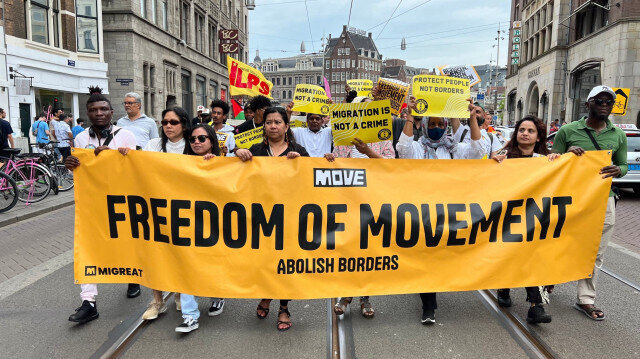Increasing exploitation of Filipino migrants undermines Dutch labor rights
NFS Press release
Amsterdam, May 1, 2024
Due to lack of work, low wages and poor working conditions, many Filipinos seek work abroad as Overseas Filipino Workers (OFW) to help their families out of poverty and provide a better future for their children. In total, about 10 million Filipinos live abroad, including 2.3 million Overseas Workers. Last year, around 1 million workers left as domestic helpers or professionals. Not only are they separated from their family, they are extra vulnerable to abuse in a foreign country.
This includes Simon (not his real name). He was born in Bicol, where south Luzon borders the Visayas. He worked as a welder in construction, among other things. Married and 3 children, they live in Bulacan, north of Metro Manila. Before their first child was born, he left and started working as a highly qualified welder (tig welder) to support his family. He worked for many years in various countries in Asia and the Middle East, including in oil refineries.
This time he was sent in a group of overseas workers to a company in Poland with the promise that their visas and work permits had been arranged. You come to work, but here they first had to take new tests and undergo a medical examination and pay again for that. Then he started to have his doubts. He worked there, but more often not, waiting for work. Ultimately, two of them were sent to Belgium. Same story there, take tests again and work for a few days, but more often not. That means not making any money. As a migrant, he was promised 12 euros per hour, not even the minimum wage, while fellow workers doing the same welding work earned 37 to 40 euros per hour! Count your profit for the intermediary companies that make a lot of money with this revenue model! During this entire process, Simon expressed his dissatisfaction and stood up for his rights. On March 21, he was transferred to the Netherlands where he worked for only a few days again. Due to the abuses he experienced, he wrote to the Philippine embassy. Then it turned out that the documents they had arranged for him were fake. He was put under pressure! He would no longer get work if he did not withdraw his letter of protest. He eventually contacted Migrante-Netherlands, the organization that represents the interests of Filipino migrants. They are now standing up for his rights with the help of other organizations, so that Simon gets paid what he is owed and can go back to work for his family in the Philippines.
Labor rights in downward spiral ‘Race to the Bottom’
What happened to Simon is not an isolated incident. Filipino workers are more often employed through a Polish or Bulgarian company in countries such as the Netherlands, Belgium and Germany, to work for the wages and working conditions (including social insurance), which apply in Poland and which are much lower than those in the Netherlands. This has previously been denounced by the Dutch FNV trade union among groups of Filipino drivers who worked in the Netherlands. Not only are these overseas workers exploited, but with their low wages and working conditions, the rights that apply in the Netherlands are further eroded. The Filipino drivers received lower wages and worse working conditions than required by the collective bargaining agreement for the transport sector.
For example, companies like the one Simon works for have much cheaper workers, with which they outcompete companies that pay their employees properly according to the applicable collective labor agreement. It is competition based on employment conditions, which is prohibited. We call this the ‘Race to the Bottom’, where there are no more rights, no lower limit, so that only dire poverty remains for them.
In 2007, the Ecumenical Institute for Labor Education and Research (EILER) published the publication ‘Race to the Bottom Laboring under imperialist globalization in the Philippines’. It explains how the flexibilization of labor not only reduces wages earned, but also breaks down other rights, including those to organize. In the Netherlands there has also been a clear trend over the past 40 years of lowering the minimum wage and reducing social services. This Polish construction adds an extra layer to the ‘Race to the Bottom’ to further erode those rights!
Sources:
EILER, 2007 Race to the bottom Laboring under imperialist globalization in the Philippines
Nieuwsblad Transport, 2024 Utrechtse transporteur had dertien illegale chauffeurs in dienst https://www.nt.nl/wegvervoer/2024/04/02/utrechtse-transporteur-had-dertien-illegale-chauffeurs-in-dienst/?gdpr=accept
NRC, 2024 Hoe flexibilisering van dé oplossing tot hét probleem werd https://www.nrc.nl/nieuws/2024/04/12/hoe-flexibilisering-van-de-oplossing-tot-het-probleem-werd-a4195945?t=1713074311
RTV Oost, 2024 Vijftig Filipijnse chauffeurs volgens FNV uitgebuit door transportbedrijf uit Deventer https://www.rtvoost.nl/nieuws/2324605/vijftig-filipijnse-chauffeurs-volgens-fnv-uitgebuit-door-transportbedrijf-uit-deventer

